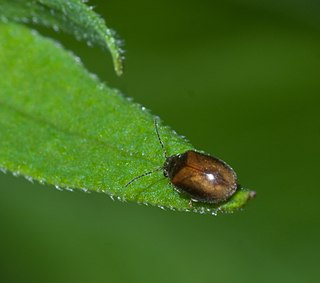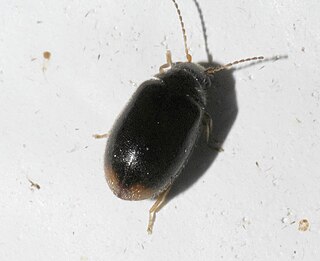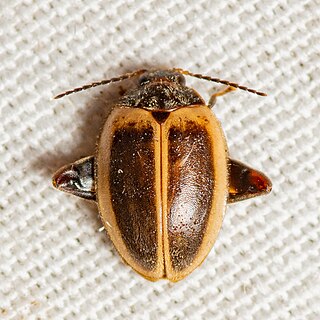
Scirtidae is a family of beetles (Coleoptera). These beetles are commonly referred to as marsh beetles, as the larvae are typically associated with stagnant water, but can be found in flowing water. Adults prefer decomposing plant material near the water's edge. More than an estimated 600 species are known worldwide, distributed among at least 60 genera.
Contacyphon americanus is a species of marsh beetle in the family Scirtidae. It is found in North America.

Contacyphon is a genus of marsh beetles in the family Scirtidae. There are over 100 described species in Contacyphon, all of which were formerly treated under the deprecated name Cyphon, which was recognized as an objectively invalid name.
Contacyphon cooperi is a species of marsh beetle in the family Scirtidae. It is found in North America.

Contacyphon pusillus is a species of marsh beetle in the family Scirtidae. It is found in North America from British Columbia east to Quebec and south to Florida. Contacyphon neopadi was synonymized with C. pusillus and all previously documented occurrences of C. padi in North America are now considered to be this species.

Sacodes pulchella, the beautiful marsh beetle, is a species of marsh beetle in the family Scirtidae. It is found in the eastern and central United States and southeastern Canada.
Elodes apicalis is a species of marsh beetle in the family Scirtidae. It is found in North America.
Elodes maculicollis is a species of marsh beetle in the family Scirtidae. It is found in North America.
Ora texana, the Texas flea marsh beetle, is a species of marsh beetle in the family Scirtidae. It is found from Virginia to Texas in the United States south to Costa Rica.

Ora discoidea is a species of marsh beetle in the family Scirtidae. It is found in Central America and North America from Texas to Florida.
Nyholmia confusa is a species of marsh beetle in the family Scirtidae. It is found in North America.
Herthania concinna is a species of marsh beetle in the family Scirtidae. It is found in North America.
Herthania is a genus of marsh beetles in the family Scirtidae. There are at least seven described species in Herthania.
Ora troberti is a species of marsh beetle in the family Scirtidae. It is found in Florida and Texas in the United States south through Central America.
Contacyphon perplexus is a species of marsh beetle in the family Scirtidae. It is found in North America.
Scirtes goliai is a species of marsh beetle in the family Scirtidae. It was described based on specimens from southern Florida, the Cayman Islands, and the Bahamas and is expected to generally occur in the Caribbean bioregion.
Contacyphon padi is a species of marsh beetle in the family Scirtidae. It is found in Europe and Northern Asia.

Sacodes thoracica is a species of marsh beetle in the family Scirtidae. It is found in eastern and central United States and southeastern Canada.
Microcara explanata is a species of marsh beetle in the family Scirtidae. It is found in North America.
Ora hyacintha is a species of marsh beetle in the family Scirtidae. It is only known to occur in Florida.





